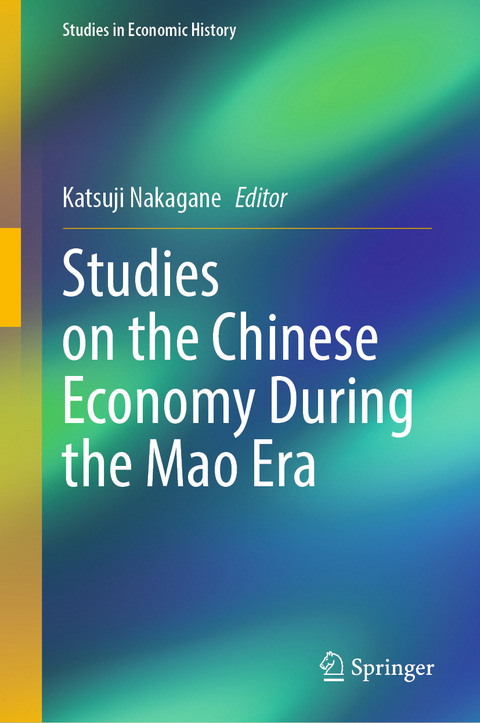
Studies on the Chinese Economy During the Mao Era
Springer Verlag, Singapore
978-981-19-5409-2 (ISBN)
It provides the reader with basic knowledge of the continuity and discontinuity between the Mao and Deng eras. Readers are provided with some important clues for thinking about how Maoist China could have contributed to or alternatively prevented today’s economic development. The topics addressed here include a brief overview of economic development under Mao, significant differences between Mao and Deng economics, and socialist transformations during the early Mao era. These include collectivization as well as communization and the effects on agricultural productivity; water supply construction drives utilizing a vast amount of rural surplus labor; rural finance; the effects on national savings, and the development of heavy and light industry. Also considered are the effects on the socialist industrialization, rural small-scale industries during the Cultural Revolution and their aftermath, and the realities of social life in a Third-front construction site promoted by Mao’s military strategy in the 1960s. This book is highly recommended to readers who are interested in contemporary China’s economy, particularly to scholars and students. The volume gives new insight into the background or preconditions that made possible historically rare miracles of the Chinese economy after Mao.
Katsuji Nakagane is a professor emeritus of The University of Tokyo. He also taught at Hitotsubashi University and Aoyama Gakuin University. He obtained his Ph.D. in international economics at The University of Tokyo in 1992. He was formerly president of the Japan Association of Asian Studies, president of the Japan Association of Comparative Economics Studies, president of the Japan Association of Chinese Economic and Management Studies, and editor-in-chief of the Developing Economies. He has published several books on the Chinese economy, development economics and systemic transition in Japanese, such as Studies on the Chinese Economy (University of Tokyo Press, 1992), Studies on the Development of the Chinese Economy (Yuhikaku, 1999), The Political Economy of Systemic Transitions (Nagoya University Press 2010), Contemporary China and Development Economics (Nagoya University Press, 2012), andMao Zedong—The Truth Falls Down from Heaven (Nagoya University Press, 2021).
Chapter 1: Mao Zedong’s Political Economics and Deng Xiaoping’s Economics.- Chapter 2: From “New Democracy” to “Socialist Transformation”: Bankers and Commercial Associations in 1950s Chongqing.- Chapter 3: Examination on Collective Farming from Production Cost Survey.- Chapter 4: People’s Communes: A Microanalysis Based on Accounting Data of Production Team X in Jiangsu Province (1965-81).- Chapter 5: Water Use Construction: Flood Control and Irrigation Projects and Labor Accumulation.- Chapter 6: Rural Finance: State Banks and Rural Credit Cooperatives in the Context of Fund Transfers.- Chapter 7: Heavy Industry: Heavy Industrialization and Its Evaluation.- Chapter 8: Light Industry: Socialist Industrialization and the Textile Industry.- Chapter 9: Rural Industry: Policy on Five Small Industries with a Special Emphasis on the Fertilizer and Cement Industries.- Chapter 10: Chinese Societies during the Mao Era: Work and Life in the “Shanghai Small Third Front”.
| Erscheinungsdatum | 25.01.2023 |
|---|---|
| Reihe/Serie | Studies in Economic History |
| Zusatzinfo | 27 Illustrations, color; 8 Illustrations, black and white; XVIII, 261 p. 35 illus., 27 illus. in color. |
| Verlagsort | Singapore |
| Sprache | englisch |
| Maße | 155 x 235 mm |
| Themenwelt | Geisteswissenschaften ► Geschichte ► Regional- / Ländergeschichte |
| Geschichte ► Teilgebiete der Geschichte ► Wirtschaftsgeschichte | |
| Wirtschaft ► Allgemeines / Lexika | |
| Wirtschaft ► Volkswirtschaftslehre ► Makroökonomie | |
| ISBN-10 | 981-19-5409-7 / 9811954097 |
| ISBN-13 | 978-981-19-5409-2 / 9789811954092 |
| Zustand | Neuware |
| Informationen gemäß Produktsicherheitsverordnung (GPSR) | |
| Haben Sie eine Frage zum Produkt? |
aus dem Bereich


